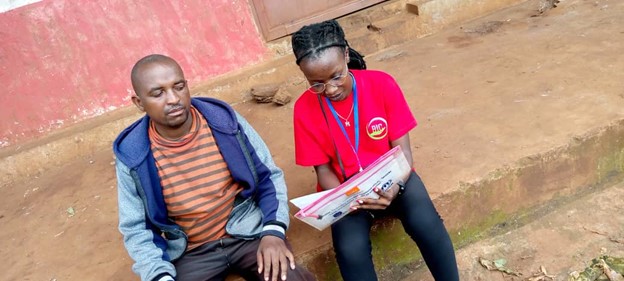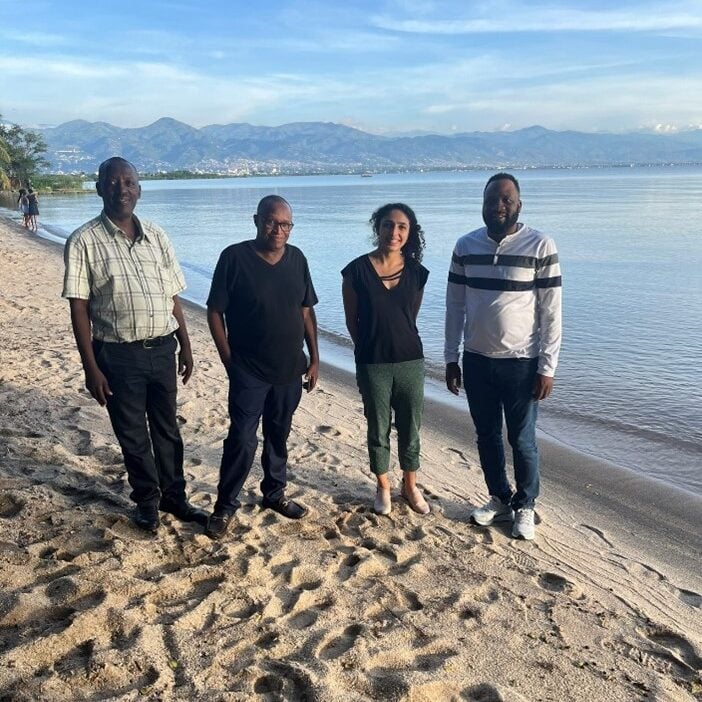By Ilgi Bozdag and Felix Ndama Wa Ndama

The East African country of Burundi currently hosts 300,000 forcibly displaced and stateless people. This includes 85,000 refugees and asylum-seekers, 25,000 internally displaced persons, 800 people at risk of statelessness. At the same time, UNHCR repatriated over 185,000 Burundian refugee returnees since September 2017. The UN Refugee Agency’s involvement in the country focuses particularly on providing assistance and protection for these populations as well as promoting their inclusion in national systems, enhancing their self-sufficiency, and supporting durable solutions, such as integration or resettlement.
In 2021, UNHCR launched its Results Monitoring Surveys (RMS). These household-level surveys facilitate and harmonize the monitoring of changes in the lives of forcibly displaced and stateless persons. Burundi was one of more than 30 countries where the RMS have been implemented in 2022 and 2023. The RMS in Burundi covers refugees and asylum-seekers as well as refugee returnees, with representative samples for all groups on a national level.
In November 2023, a joint UNHCR team, from UNHCR’s Global Data Service and from the Division of Strategic Planning and Results travelled to Burundi, when the country operation was completing the RMS for the second time. The visit had three aims: to train UNHCR colleagues on the RBM framework, to further improve data quality and train the enumerators in the field. Furthermore, the visit provided additional insights on necessary changes in order to get high-quality data for forcibly displaced populations in Burundi and to monitor their socio-economic status. This is always measured alongside other impact and outcome indicators, such as access to basic services (e.g. health and education), possession of legal identity documents, and safety.
The local survey firm, GNK, had been selected to support UNHCR’s data collection efforts in the country. GNK has extensive local experience in Burundi, particular in the area of survey data collection. According to Gerard Nkurunziza, Head of GNK, the collaboration was very fruitful: “This cooperation was very beneficial since GNK had an opportunity to contribute with local knowledge and extensive survey experiences in the field to have a better data quality.”

UNHCR and GNK jointly organized a training for local enumerators during this visit. It is crucial for enumerators to understand the populations, that they interview, beyond the questionnaire. UNHCR colleagues in Burundi shared their expertise around protection of refugees and asylum-seekers and the context of the country. Additionally, the Global Data Service provided the statistical expertise to the training. Together with the local expertise of GNK in Burundi, it provided the enumerators a context to make better decisions in the field.

Gerard Nkurunziza shared: “We had young enumerators who did not know how to use a tablet – and due to the training and subsequent experiences during the data collection, we now have a team of 30 people with the abilities to do surveys. We certainly strengthened our capacities, but now we also have developed new experiences with forcibly displaced populations, in particular with refugees.”
Some enumerators were refugee returnees themselves, but still appreciated to learn more from UNHCR and about its mandate. One of the enumerators, who had collected data in both years, said that this training gave them a better perspective on understanding the refugees living in Burundi. According to Gerard Nkurunziza: “In the team, we had returnees who came from Tanzania – young people who returned in Burundi. Their language capacity helped [to connect with other refugees and returnees].”
And what did the interviewees themselves say about the data collection?
- When I see you coming back (to interview us), I am happy. You accept to sit with us, and take your time to listen to our difficulties. That truly comforts. We know that UNHCR will always be on our sides. (Refugee Family)
- You come here and you find us at our home, realizing which conditions we live on a daily basis. This gives an occasion to express ourselves. You are different than the others who unite us to discuss in groups where we can’t get a chance to speak, and you give us a chance to speak up individually. (Refugee)
- Even if you don’t give us any assistance, your presence proves that if UNHCR finds any way to provide support, you will come and help us, especially since your reports will describe our living conditions. (Refugee returnees)
- When UNHCR sends you to interview about how we are living after so many years of repatriation back in Burundi, it gives us the assurance that UNHCR still cares about us. (Refugee returnees)
- We were afraid that UNHCR would no longer think of us after our repatriation back to Burundi. Your presence is as a reassurance from UNHCR that comforts us. (Refugee returnees)
- The fact that you come to visit us with lists of households to visit proves the impartiality and transparency of UNHCR’s work. (Refugee Family)
- The involvement of our committee (Executive Committee of Urban Refugees) and the local administration in the region once again demonstrates the impartiality and transparency of the work you do on behalf of UNHCR. (Refugee Family)
Overall, the great cooperation between the different parties, operation information management, Global Data Service and the Burundi survey firm GNK strengthened the data quality on forcibly displaced populations all together. The mission in Burundi was important to train enumerators and learn from the experiences of last year.
As GNK’s Gerard Nkurunziza put it: “Thanks to the results obtained through the RMS, this data can support the evidence-based approach to implement the right programmes in Burundi to help the reintegration of refugee returnees in the country and improve the situation of the refugees.”
The operation in Burundi will have representative data of all population groups mentioned above which will also help with evidence-based programming. Both datasets are also expected to be published on the UNHCR Microdata Library for further use by researchers.

